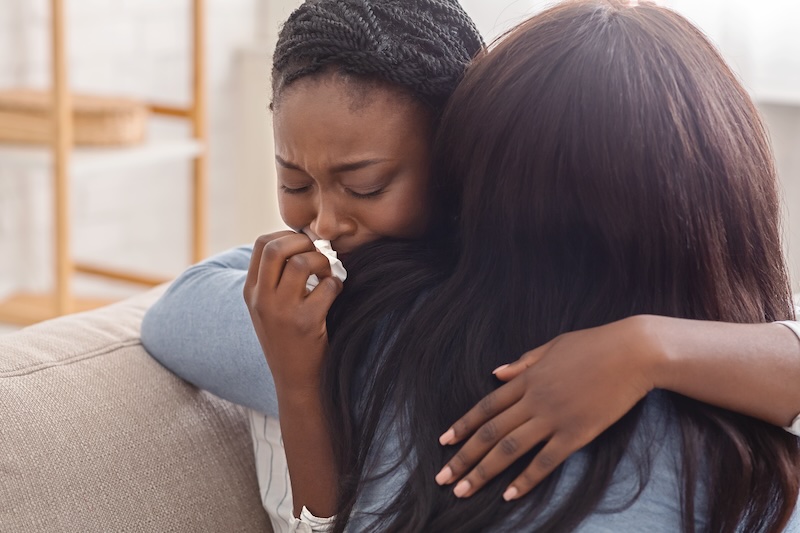By Dr. Jennifer L. Yocum, Licensed Acupuncturist
In Chinese Medicine, the emotion that corresponds to the fall season is grief. Grief can show up in many ways, and is complex. Unfortunately, in American culture, grief is also often encouraged to be suppressed, or expressed in private. Many people feel pressured to move on quickly after the loss of a loved one or a relationship ending. However, when we do not fully express our emotions, including grief, loss, or feelings of emptiness or longing, then this can manifest as physical symptoms in the body and/or negatively affect our mental health.
According to the American Psychological Association (n.d.), “grief is the anguish experienced after significant loss, usually the death of a beloved person. Grief often includes physiological distress, separation anxiety, confusion, yearning, obsessive dwelling on the past, and apprehension about the future. Intense grief can become life-threatening through disruption of the immune system, self-neglect, and suicidal thoughts. Grief may also take the form of regret for something lost, remorse for something done, or sorrow for a mishap to oneself.”
As people move through grief, they typically go through stages, which may not always be linear. The most famous model is the Kübler-Ross model from 1969, which suggested five stages of grief: denial, anger, bargaining, depression, and acceptance. However, as time went on, other models were developed, such as the Bowlby and Parkes’ Four Phases of Grief (shock and disbelief, searching and yearning, disorganization and repair, and rebuilding and healing), which emphasized the non-linear reality of moving through the grieving process (Tyrrell et. al., 2023). One thing is clear- grief is a messy process, with highs and lows, and much unpredictability. As an acupuncturist, it is my job to meet my patients wherever they are in the process and do my best to support them.
If you are experiencing grief, there are several things you can do to support yourself:
- Allow yourself to cry. Crying does not make you weak; it shows you cared for that person, relationship, time of life, or way of being. Let the tears flow when you feel them arise, and do not attempt to stifle them. Wail or ugly cry if you need to. Allow the pain to move through you as you release the tears.
- Get out your anger. Scream into a pillow, punch a punching bag, pillow, or bed, or smash cans or glass bottles in a safe area. Go in your car or room and get out all of the horrible things, with as many explicatives as you’d like, that you want to say. Anger is another emotion that Americans have a hard time feeling comfortable in, and it is just as equally valid as any other emotion.
- Acknowledge your pain. Someone, something, or some idea that you loved is no longer here in the same way. There is a deep pain from this loss, and it may feel like there is a hole or emptiness in your heart. It is ok and safe to admit that you are in pain. All human beings experience pain and loss. You are a beautiful human being, going through a challenging time. You will eventually get through it, but right now it hurts. Do not deny yourself the feeling of that pain; like the tears, it shows your deep affection and caring spirit.
- Tend yourself. Grief can suck us in, and encompass our lives. To best support yourself, it’s important that you eat healing foods, get in gentle exercise, and proper hydration (especially if you are crying a lot). When our bodies have their basic needs met, the energy will flow better and be less likely to get stuck and cause physical or mental symptoms.
- Take deep breaths. In Chinese Medicine, the lungs are one of the main organs associated with grief and loss. Take moments each day to deeply inhale and then exhale. This will help to support the lungs and regulate your nervous system.
- Lean on social and mental health support. Talk to others about what you are going through. Reach out to family, friends, mental health therapists, and healthcare providers and talk about how you feel. If a loved one has died, see if others who knew them want to get together and talk about it, or perform your own ritual or ceremony to help you let go of that person. If you are feeling suicidal, please call the Suicide and Crisis Line (988) and/or reach out to a mental health professional. You do not have to go through the grieving process alone.
Grief is not an easy process, but it is one we all will go through. As E.A. Bucchianeri said, “when all is said and done, grief is the price we pay for love.” In the end, despite the pain you feel now, it’s a beautiful thing that you had that love in your life for those moments in time.
References
American Psychological Association. (n.d.). Grief. https://www.apa.org/topics/grief
Tyrrell, P., Harberger, S., Schoo, C., and Siddiqui, W. (2023, February 26). Kubler-Ross stages of dying and subsequent models of grief. StatPearls. https://www.ncbi.nlm.nih.gov/books/NBK507885/
Note: This article was originally published in a local magazine for their November 2024 issue. For citation references, please contact Dr. Yocum at https://jenyocum.com/contact/


Recent Comments